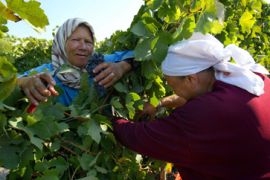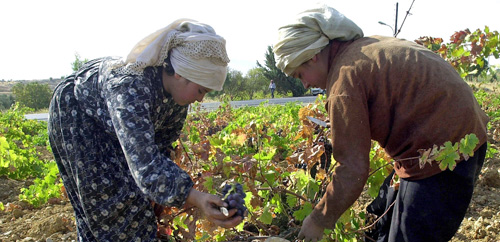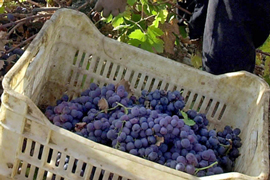Arab wine shakes off prejudice
Wines from the Middle East experience a renaissance.

 |
| Lebanon now has 18 vineyards compared with three in 1990 [GALLO/GETTY] |
Wines from the Arab world are experiencing something of a renaissance, with production and turnover growing and quality constantly improving – despite opposition from conservative Muslims.
After a long break due to nationalisations, war and the European ban on “blended” wines, the viniculture is now in full bloom in Algeria, Egypt, Jordan, Lebanon, Morocco, Tunisia and soon in Syria.
Keep reading
list of 4 itemsUS House approves aid package worth billions for Ukraine, Israel
Ecuador weighs security, international arbitration in latest referendum
‘Triple spending’: Zimbabweans bear cost of changing to new ZiG currency
These countries currently have 80,000 hectares of vineyards and produce 1.3 million hectolitres (33.8 million gallons) – which translates into 146 million bottles.
As a result, Arab countries have built a turnover of $340 million with nearly 50,000 people directly or indirectly employed in the wine sector.
But this new gusto for wine has alarmed those who believe wine is haram (forbidden) in Islam.
In Morocco parliamentarians have suggested heavy taxes on alcoholic drinks, and in Egypt every year, the Muslim Brotherhood puts forward proposals to ban wine.
‘Chateau Migraine’
The Lebanese director-general of one of Egypt’s largest wine-makers, Andre Hadji-Thomas, remembers his 1998 visit to the Gianaclis estate – put up for sale 30 years after its nationalisation by then president Gamal Abdel Nasser – an era of Egyptian wine-making that was dubbed “Chateau Migraine”.
“After uncorking a bottle, the Egyptian wine-maker of the estate revealed to us that, despite 20 years in the profession, as a good Muslim he had never touched a drop of wine.”
In the past seven years, Egypt has doubled its production to a total today of 8.5 million bottles, three-quarters of which is consumed by tourists.
“If the product continues to improve, and tourism keeps booming, we will double production in the next five years,” Hadji-Thomas said.
In Syria, the nationalisations of the 1960s equally undermined wine production. But recently one businessman, Johnny Saade, planted a vast estate near the port of Latakia which will start producing wines in two years time.
In Lebanon, 15 years of civil war have hindered the industry, but now the country can look to 18 vineyards, compared with three in 1990.
Charles Ghostine, chief executive of the Lebanese Ksara vineyard – now celebrating its 150th birthday – said: “Given the intensity of the competition, our producers are banking on excellence, and our wines win awards worldwide.”
This would seem to have been a wise decision: with an output of just seven million bottles, turnover in 2007 was up by 10 per cent at 27 million dollars, and exports stand at 40 per cent.
War on grapes
Jordan’s pedigree in wine production was also affected by war.
After the Israeli occupation of the West Bank in 1967, new vineyards had to be set up north of Amman.
In the Maghreb, decolonisation and the then European Community’s ban on blended wines at the end of the 1950s dealt a fatal blow to wine production, notably in Algeria, which was once the world’s fourth largest wine producer, with 18 million hectolitres.
 |
| Conditions in the Middle East are becoming conducive to wine production [GALLO/GETTY] |
These days, the Oran province in Algeria, the Nabeul region of Tunisia and Meknes in Morocco produce the majority of Arab wine.
These areas have 13 million hectares of vineyards and about 15 “appellations controlees” – areas of supreme quality – of which 20 per cent are exported to Europe.
Jean-Pierre Dehut, export director with Morocco’s largest wine producer, Cellars of Meknes, said: “It’s important to battle against the prejudices that surround Arab wines.
“Too many people still believe it’s like in colonial days when tankers full of mixed wines sailed across the Mediterranean to top up European wines.”
Denis Dubourdieu, a French wine expert, said: “There are three factors favourable to wine consumption: money, democracy and peace.
“Even if the Arab world doesn’t always have all three, conditions are slowly but surely becoming more favourable in the region.”